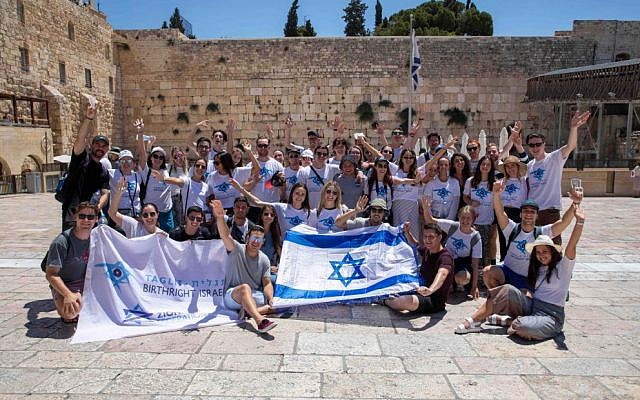‘A grim fate awaits us unless we act’
'If Jewish continuity is both our single greatest challenge and our most important objective, it is imperative that we direct our energy and resources accordingly'.
DURING a recent visit to Israel, Bougie Herzog, chairman of the Jewish Agency and former leader of the Opposition, asked me how life was Down Under in the ‘golden medina’.
In the late 19th and early 20th centuries, it was America that held the auspicious title ‘Die goldene medina’, as European Jews looked to build a better life in a country they believed would make their dreams come true.
But on all important indicators, American Jewry has been in decline for some time. And, while other Diaspora communities have claimed the crown over the years, it is Australia that is most often referred to as the ‘golden medina’ of world Jewry.
In many respects, this blue-sky view is justified. About half our children are enrolled in Jewish day schools – a figure the US would find unimaginable – and a very significant percentage have attended a youth movement.
In the groundbreaking Gen17 survey, more than two-thirds of us defined ourselves as Zionists and an even higher percentage said that when Israel is in danger, we feel personally exposed.
While this is testament to the strength of the enduring bond between our two nations, I fear that it obscures some deeply worrying signs of decline in Australia.
Contrary to the rosy picture that lulls many of us into complacency, if we do not urgently rethink our priorities as a community, we risk the same grim fate that has befallen other, formerly thriving communities in the Diaspora.
As we know from Gen17, the intermarriage rate in Australia almost doubled between the 1990s and the 2010-2017 survey period. Among all Jews living in a relationship, nearly one-quarter have a non-Jewish partner. Most worrying is the finding that Jews aged under 40 are less likely to be concerned about intermarriage than their parents and grandparents were.
The threat of assimilation is nothing new. But it needs to be viewed in the context of other, less obvious challenges that go to the very heart of our identity as Jews.
About one-third of us feel no sense of connection to the community, while more than half (of those who do not identify as Orthodox) indicated that being Jewish was not a central part of their lives.
Given that a substantial proportion of the respondents would have attended a Jewish day school, these numbers are alarming.
While some people may be comforted by the fact that the overwhelming majority of respondents to the survey said that remembering the Holocaust was the most important factor in their Jewish identity, I found this statistic arguably the most concerning.
Of course, the Holocaust is an important part of our Jewish identity, but tragedy and suffering cannot and should not define our Jewish identity. It is a sense of being Jewish that celebrates our rich tradition and proud values that will inspire and sustain future generations of Jews. Not one that is founded on identifying as an oppressed people.
Our Jewish day schools will continue to play a pivotal role in sustaining this sense of identity. But, realistically, there is no solution in sight to address issues of affordability and enrolments will inevitably decline.
The good news is that a highly effective vehicle for addressing these very real challenges in our community is both crystal clear and available: programs that give young people an intensive experience of Israel in their formative years post high school have been found to instil both a lasting love of Israel and a strong Jewish identity. We have a strong established culture of long-term Israel program participation in our community which cultivates the next generation of leaders.
And there is Birthright, an initiative of the Israeli government and philanthropists in the Diaspora, which started in 2000. Birthrighters take part in a relatively short (10 days), life-changing visit to Israel, a gift from the Jewish world to its next generation.
Since 2001, in partnership with Taglit-Birthright Israel and Gandel Philanthropy, the ZFA has sent almost 6000 young Jewish adults from around Australia on Birthright – that’s one-quarter of all young Jews in this country between the ages of 20-34.
For most (approximately 70 per cent), it was their first trip to Israel. Importantly, about 800 of those participants are from smaller communities outside the Melbourne/Sydney centres, where Jewish life faces its greatest threat.
Rigorous research undertaken since Birthright was established shows that participants are nearly 50 per cent more likely to marry a Jewish partner, 36 per cent become more involved in community life and over 30 per cent return to visit Israel within five years, a winning trifecta in the battle against apathy and indifference.
It seems to me that, while the generosity of this community has built state-of-the-art facilities for our day schools, synagogues and sporting centres – all worthwhile initiatives – there’s a far more significant pay-off from Birthright in terms of Jewish identity and wellbeing.
If Jewish continuity is both our single greatest challenge and our most important objective, it is imperative that we direct our energy and resources accordingly.
The future of our community may well depend on it.
Jeremy Leibler is president of the Zionist Federation of Australia.


comments